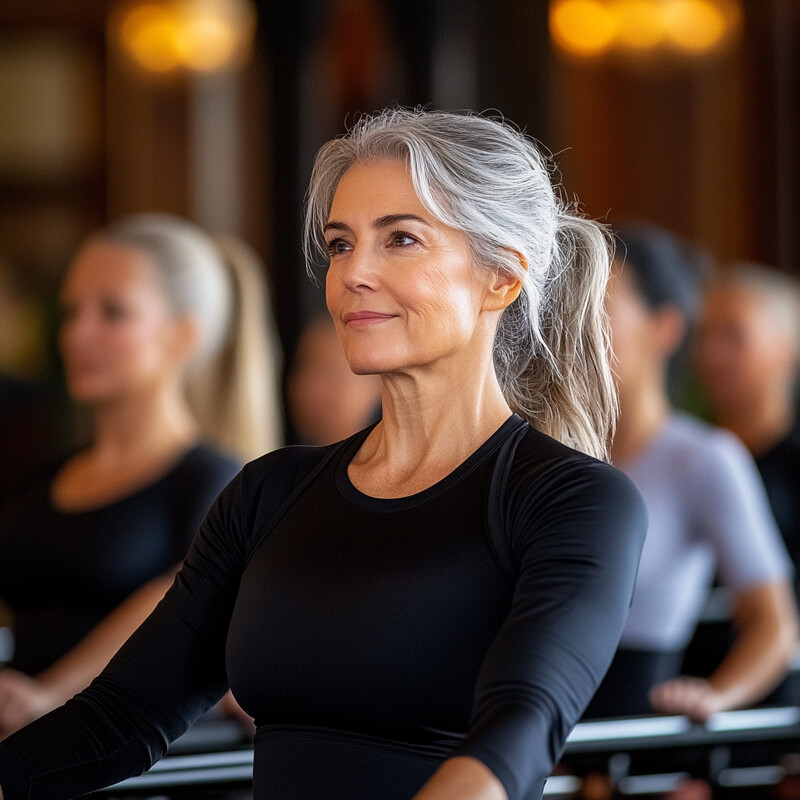Pilates is a popular form of exercise that offers numerous benefits for both the body and mind. Here are five great things about Pilates:
Improves Core Strength and Stability: One of the primary focuses of Pilates is strengthening the core muscles, including the abdominals, back, and pelvic floor. A strong core not only enhances physical performance but also helps improve posture and stability, reducing the risk of injuries.

Enhances Flexibility and Muscle Tone: Pilates exercises involve a range of motions that stretch and lengthen muscles, promoting flexibility. The low-impact, controlled movements help to tone muscles without adding bulk, leading to a leaner, more sculpted appearance.

Promotes Better Posture and Alignment: By focusing on body awareness and alignment, Pilates helps individuals develop better posture. Improved posture reduces the strain on the spine and muscles, which can alleviate back pain and other discomforts related to poor posture.

Reduces Stress and Enhances Mental Focus: Pilates emphasizes mindful movement, breathing techniques, and concentration, which can help reduce stress and anxiety. The focus required during Pilates sessions can also improve mental clarity and concentration, making it a great practice for overall well-being.

Adaptable for All Fitness Levels: Pilates is highly versatile and can be tailored to suit all fitness levels, from beginners to advanced practitioners. It can be done on a mat with minimal equipment or using specialized machines like the Reformer, making it accessible and adaptable for different needs and goals.

Pilates Certification
January 25, 2005

The rising popularity of Pilates has led to more than nine million Americans practicing the regimen, emphasizing the need for standardized certification of instructors to protect the public from injury and ensure that Pilates is properly taught. According to the Pilates Method Alliance, a non-profit group seeking to regulate and guide the industry forward, national certification will become a reality in August 2005.
"Pilates is here to stay," says Kevin Bowen of the PMA. "Over the past five years, Pilates has experienced phenomenal growth rates. This has led to fitness instructors rushing to keep pace with the demand. While many are properly qualified, others have opted for weekend certificate courses or video courses that simply do not provide adequate training. In turn, the consumer can be injured or not receive the full benefits of the exercises."
In late October, the PMA announced the pending launch of the first national certification exam at its 4th International Educational Conference in New Orleans. According to Bowen, the PMA has hired Castle WorldWide, one of the largest certification and licensure testing companies in the United States, to develop an exam that measures whether or not a Pilates instructor can perform job-related duties with competence. Examinations by Castle Worldwide have been recognized by the National Organization for Competency Assurance (NOCA) as being a standard for professional competency.
"With the changing face of the fitness industry, professional competency is definitely a hot button," Bowen states. "Consumers should be made aware of this development. The move toward third-party accreditation is ultimately to protect individuals from receiving Pilates instruction from someone who took a weekend course to become certified and claims to be a competent teacher. Situations like that can lead to serious injury and reflect badly upon the Pilates exercise regimen."
There are roughly 13,000 instructors in the United States teaching Pilates and the PMA estimates that only one fourth of those individuals are adequately trained.
Until the exam is rolled out in August, the PMA offers a list of guidelines and questions to help people interested in practicing Pilates find a qualified teacher:
- Are the instructors trained through a comprehensive training program?
- Did that training program require a written and practical test, lecture, observation, practice and apprentice hours?
- How many total hours were spent in the training program? (The Pilates method is a knowledge-based method of exercise and training. Time spent in certification training produces qualified teachers.)
- Does the instructor have any other movement related teaching experience?
- How long have the instructors been teaching Pilates?
- What is the instructor's studio's philosophy and specialty? Are they able to any handle special needs, such as pregnancy or post rehabilitation?
- Does the instructor or studio teach the full repertoire of Pilates on all pieces of apparatus?
PMA maintains a searchable online database of members who have completed sufficient training and education for an instructor near them. Once the exam is launched, this database will be expanded to include all individuals who have achieved certification.
"The PMA has long recognized the need for creating industry standards," Bowen adds. "We began developing a certification exam three years ago. Our goal is to create a professional standard for the industry and give consumers greater protection from incompetence while preserving the quality of the Pilates method. We are encouraging health clubs and studios to only hire Pilates instructors that have received third-party accredited Pilates certification to protect both their clients and themselves."
The Pilates Method Alliance is the international, not for profit, professional association dedicated to the teachings of Joseph H. and Clara Pilates. The PMA's mission is to protect the public by establishing certification and continuing education standards for Pilates professionals.